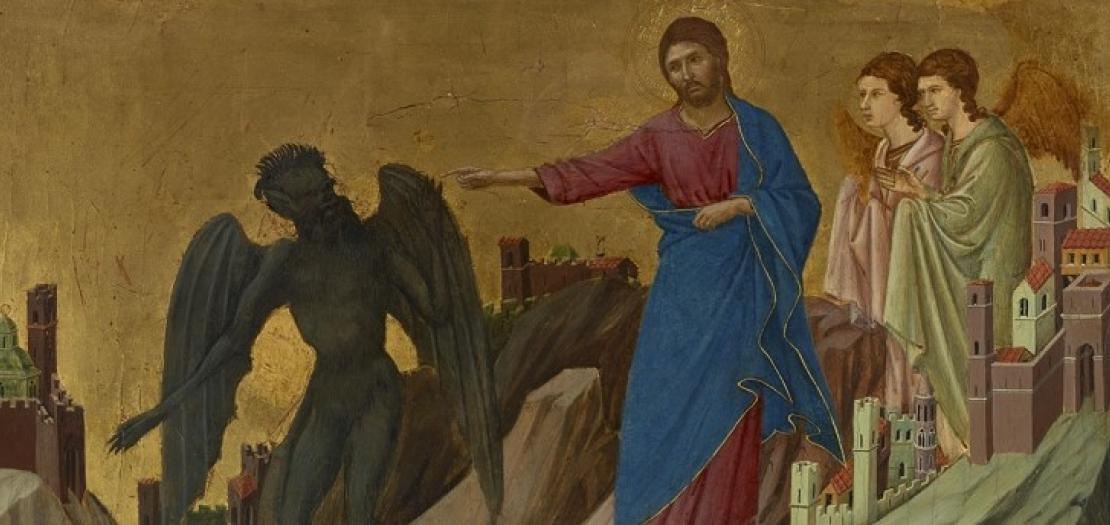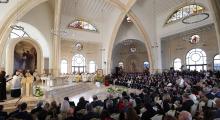Issued by the Catholic Center for Studies and Media - Jordan. Editor-in-chief Fr. Rif'at Bader - موقع أبونا abouna.org

Following is the text of the meditation by His Beatitude Cardinal Pierbattista Pizzaballa, Latin Patriarch of Jerusalem, for the fourth Sunday of ordinary time B, dated January 28, 2024:
Last Sunday we heard Jesus' invitation to convert, (Mark 1:15) to take the first steps of a new life. We said that this is possible, for everyone, and that this is precisely the good news that Jesus came to announce.
Well, this conversion takes on a particular trait in today's Gospel. (Mark 1:21-28)
For we see that from the very beginning of his public life, Jesus immediately encounters and clashes with a central issue for human life, namely, the problem of evil.
The evangelist Mark makes it clear that Jesus will have to confront this enemy, and that the struggle will be hard.
Of this Gospel we dwell on a few elements.
Jesus, entering the synagogue in Capernaum, finds a man possessed by an unclean spirit, who, at the sight of Jesus, comes out and begins to cry out.
The man, first of all, is possessed by the unclean spirit. That is, he is inhabited by a spirit that holds him captive, that does not leave him free to be himself, that keeps him away from life.
So, we immediately understand what the battle is that Jesus has to face: the battle is to bring man back to the lordship of God, to bring him back into that Kingdom that has come near, that has opened up to bring back the lost and distant man. Jesus' battle is to restore our freedom, for no one has the right to hold us captive, to possess our lives.
The opposite of possessing, we might say, is the way Jesus loves, which in today's passage is summed up in a term that returns twice, namely his authority. (Mark 1:22, 27) Jesus' love is an authoritative, growth-giving love; it does not possess, but liberates, and it liberates in each person his or her best part, sets in motion his or her conversion.
The unclean spirit, which possesses man, cries out, speaks, and what it says reveals to us what logic, what thought underlies the experience of evil: "What have you to do with us, Jesus of Nazareth? Have you come to destroy us?" (Mark 1:24)
The unclean spirit says all the right things, for it is true that Jesus came precisely to destroy the empire of evil, its lordship over man. But his words also say something else.
For what is evil but to think of God as someone who ruins, who is man's enemy; what is evil but the suspicion that God is against us?
The whole history of man's relationship with God is inhabited by this suspicion, this impure spirit, which sees evil where there is none, which does not trust the good that is in God.
Liberation from this suspicion is not painless: this is very clear in today's passage, just as each of us knows well that the birth in us of something new always somehow has a price to pay, something to leave behind. Something must die in order for the new to be born.
Jesus addresses the unclean spirit by speaking sternly to it, literally "rebuking" it, a term that the evangelist Mark uses other times to speak of a word that puts things in order, (cf. Mark 8:33) that puts things back in their proper place.
On the one hand, then, there is the unclean spirit shouting loudly, creating chaos and confusion. But on the other is Jesus who rebukes, who puts things in order, who brings life back.
He does this with two imperatives: 'Quiet! Come out of him!' (Mark 1:25)
First, Jesus wants to silence everything in us that says other than what He wants to say to us, everything that prevents us from listening to Him. The first step for a path of liberation is to reopen the channel of listening, is to free it from all those interferences that confuse the Lord's voice and His Word.
Then the unclean spirit must come out. It cannot remain inside man, for man will not be free until that spirit is outside of him.
The spirit comes out of man by tearing him: there is a pain in this deliverance, which is like the pain of childbirth; if you do not go through it, you do not grow toward freedom.
So that is what conversion is all about: letting ourselves be freed by the One who comes to live among us, in us.
+Pierbattista







